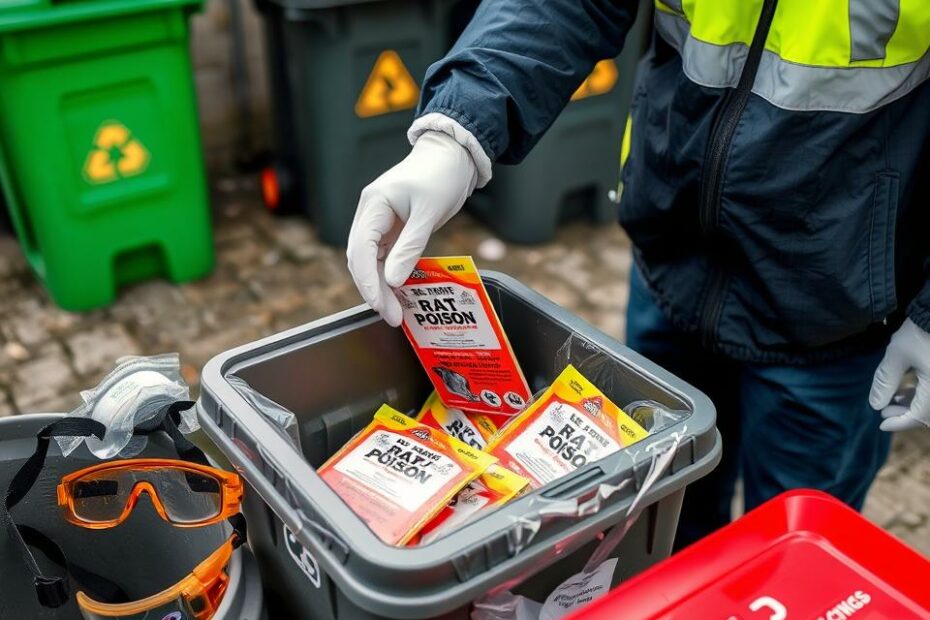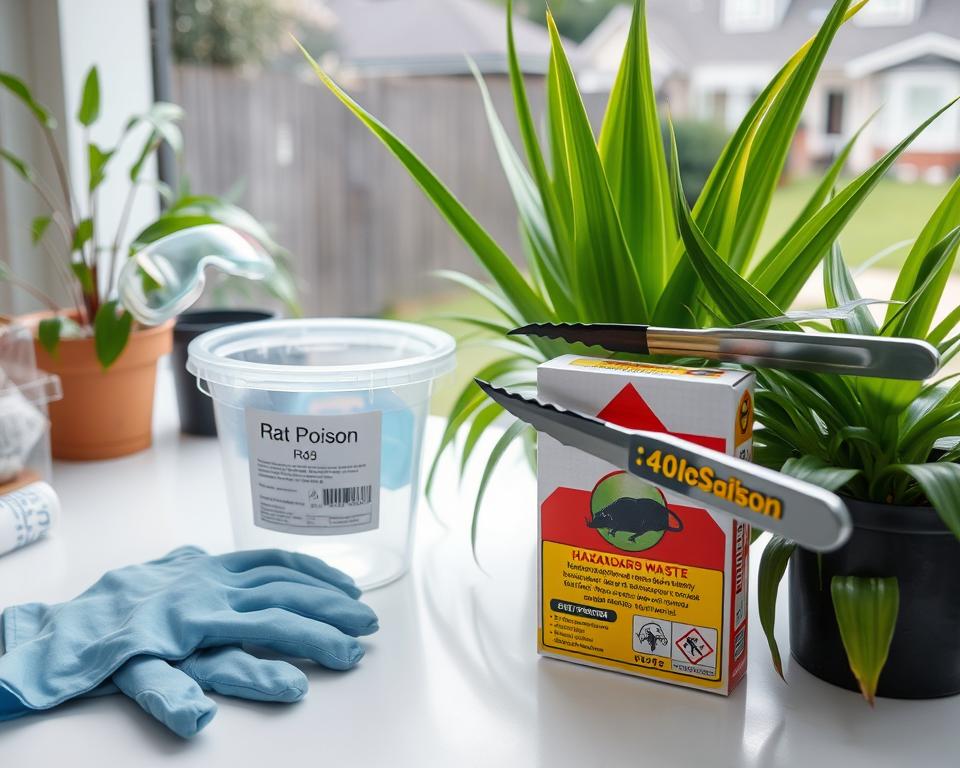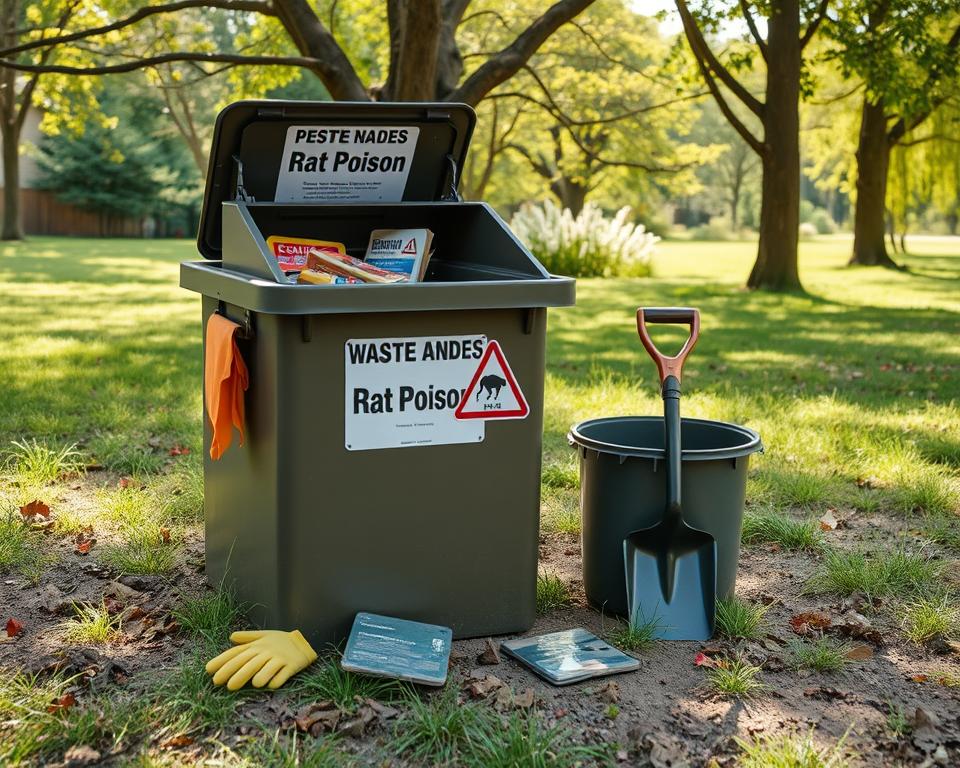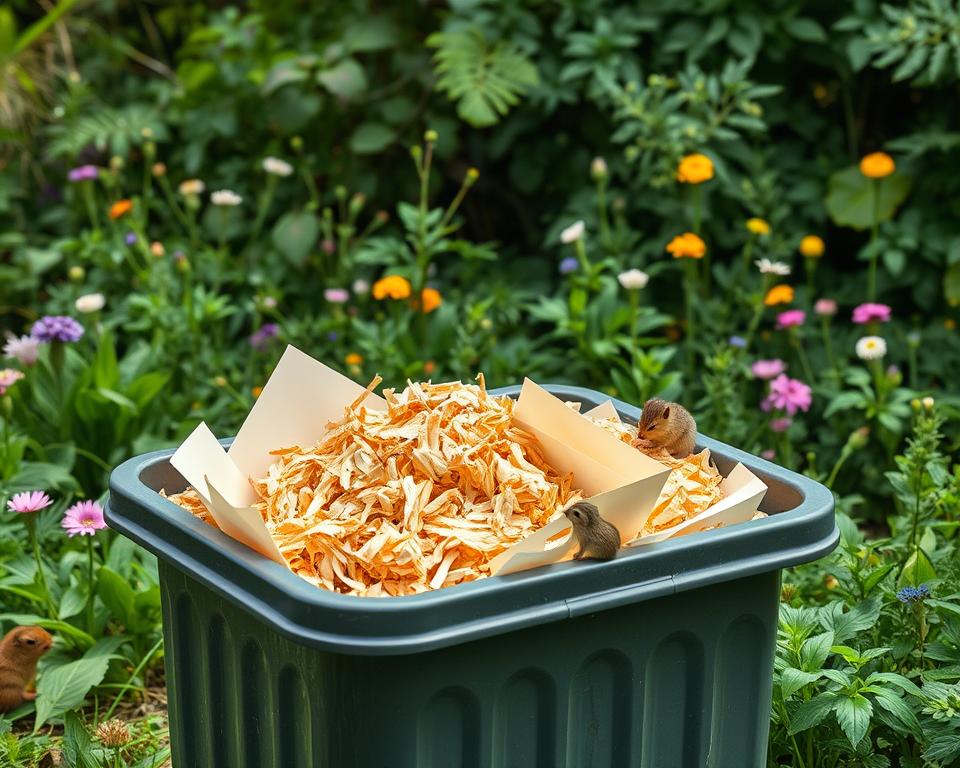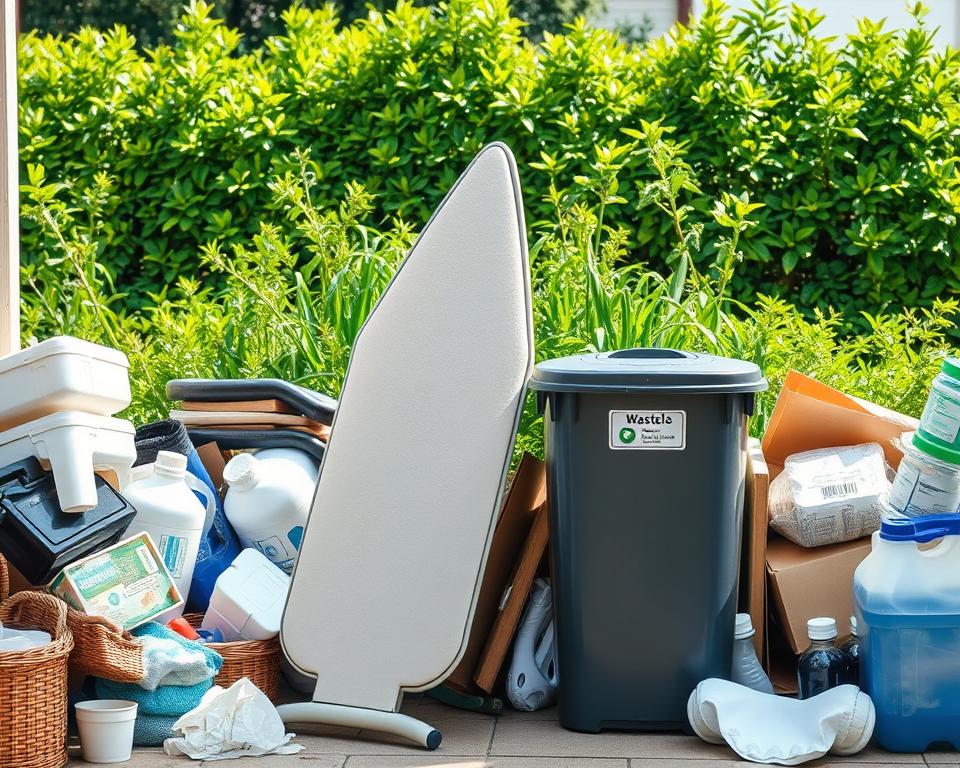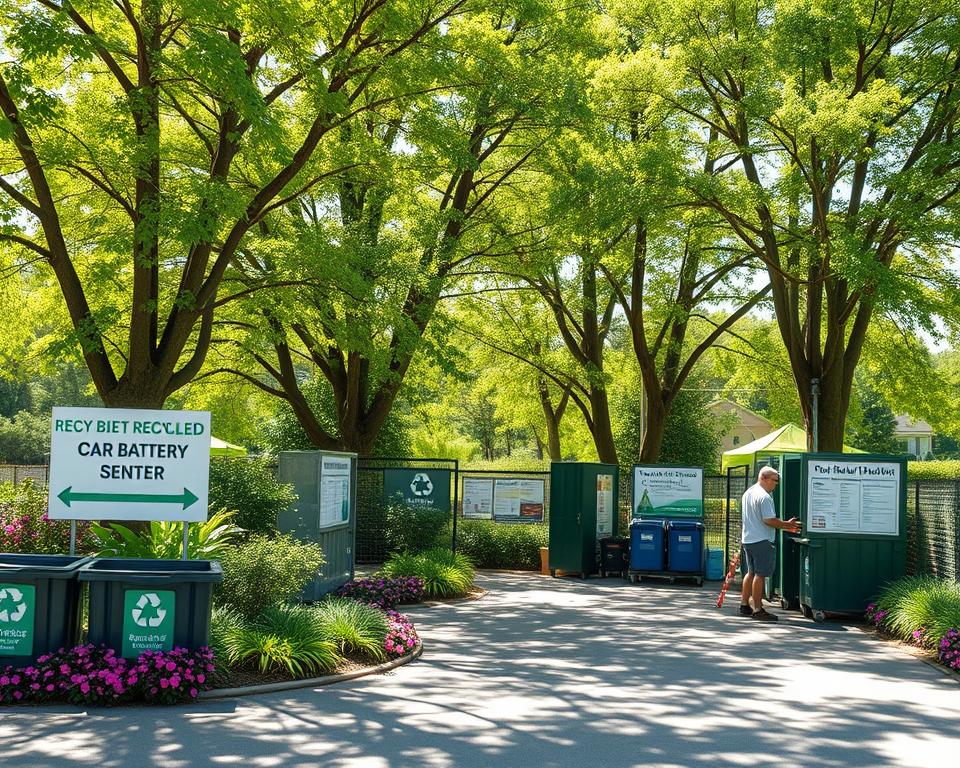Keeping our homes safe from pests is a big responsibility. But it also means we must handle rat poison carefully. This task can be scary, especially when we think about our pets and loved ones.
Imagine the worry of not disposing of rat poison right. It could harm our homes and the environment. This guide will show you how to get rid of rat poison safely. We’ll give you steps to keep everyone and the planet safe.
Key Takeaways
- Understand the toxic chemicals found in rat poisons, including warfarin and brodifacoum.
- Follow product label instructions carefully to ensure safe disposal.
- Recognize the health risks posed by improper disposal to humans and pets.
- Explore local waste management resources for safe disposal options.
- Stay informed about the potential environmental impacts of rat poison.
Understanding Rat Poison and Its Risks
Rat poison is made of certain chemicals that can harm animals. It’s used to kill rats and mice. Knowing what’s in rat poison is important for safety.
What is Rat Poison?
Rat poison is a chemical that kills rodents fast. It’s used in homes and farms to stop infestations. The poison works by messing with the rodent’s body functions.
Common Ingredients in Rat Poison
There are many types of rat poison, each with different ingredients. Some common ones include:
| Ingredient | Type | Mechanism |
|---|---|---|
| Warfarin | Anticoagulant | Prevents blood clotting |
| Diphacinone | Anticoagulant | Prevents blood clotting |
| Bromethalin | High toxicity | Kills after one feeding |
| Cholecalciferol (Vitamin D) | Chronic toxicant | Causes heart and kidney failure |
| Zinc Phosphide | Acute toxicant | Forms phosphine gas |
Health Risks Posed by Improper Disposal
Not getting rid of rat poison right can be dangerous. It can harm pets, wildlife, and people. Zinc phosphide, for example, can release a toxic gas.
Children are especially at risk because they might eat it. If someone eats rat poison, call poison control at 1-800-222-1222 right away. Keep rat poison away from where people live and play to avoid accidents.
Why Proper Disposal of Rodenticides is Essential
It’s very important to dispose of rodenticides correctly. This protects people and the environment. If not done right, it can harm many things, including us, our pets, and nature.
Impact on Humans and Pets
When people or pets accidentally eat rat poison, it’s very bad. It can look like other sicknesses, making it hard to get help fast. For example, a young child once ate rat poison and had trouble with blood clotting.
This shows how careful we must be with how we throw away rat poison. We need to stop accidents from happening.
Environmental Concerns
Rodenticides can pollute the soil and water, harming animals. When animals eat poisoned rodents, they can get sick too. In 2020, a bear got sick from eating rat poison in the woods.
This shows how rat poison can hurt animals and the environment. It makes a big problem that keeps getting worse.
Legal Implications of Improper Disposal
Laws in many places say you must dispose of harmful stuff like rat poison carefully. In British Columbia, there’s a law that says you must follow the directions on the rat poison package. If you don’t, you could get in big trouble and have to pay a lot of money.
A study in 2019 showed that people were throwing rat poison away in their trash. This shows we need to learn more about the rules and follow them better.
Best Practices for Disposing of Rat Poison
It’s important to dispose of rat poison correctly to keep our environment safe. This ensures safety for both humans and pets. Here are some key practices to follow.
Follow the Product Label Instructions
Always read and follow the disposal guidelines on the product label. These guidelines are crucial for safe disposal. Following them helps prevent environmental harm.
Contact Local Waste Management Agencies
Local waste management agencies offer safe disposal options. They provide detailed instructions on handling hazardous materials. Working with them helps you understand and follow local regulations.
How to Safely Dispose of Rat Poison
Handling rat poison safely is key for everyone’s protection. It also helps follow the law. By following the right steps, we can avoid harm to people, pets, and nature. Here’s how to handle rat poison responsibly.
Step-by-Step Guide to Handling Rat Poison
- Always wear gloves and a mask when you handle rat poison.
- Keep any leftover poison out of reach of kids and pets.
- Follow local rules for taking it to disposal sites.
Using Containers for Safe Disposal
Use strong, sealed containers for unused rat poison. Make sure to label them with the date you stored them. This way, you can avoid confusion later. Choosing the right containers is crucial for keeping everything safe.
Eco-Friendly Ways to Dispose of Rat Poison
Looking for ways to get rid of rat poison safely and responsibly is key. There are many options that help protect our environment. These methods also lower the risks from harmful chemicals.
Recycling Options
Some pest control services offer recycling for unused rat poison. Always check if they can handle it safely. They have the skills and tools to recycle, which is good for the planet and keeps us safe.
Returning to the Retailer
If you have unsealed or unopened rat poison, you can return it. Many stores take these items back, especially if they’re still in their packaging. Just call ahead to see if the store has a return policy for these products.
| Disposal Method | Description | Environmental Impact |
|---|---|---|
| Recycling Options | Return unused rodenticides to pest control operators for recycling. | Promotes sustainability by preventing toxic waste. |
| Returning to the Retailer | Return unopened or unsealed products to the retailer. | Reduces landfill waste and promotes responsible consumer practices. |
| Household Chemical Cleanout | Participate in local disposal programs for hazardous waste. | Ensures chemicals are disposed of safely and properly. |
Handling and Disposing of Rat Poison: Tips and Guidelines
Handling rat poison safely is key. You need to follow strict safety and storage rules. Before you dispose of it, make sure you’re ready to avoid accidents. It’s important to know the right way to store and transport it.
Storage Techniques Before Disposal
Storing rat poison right is essential to keep everyone safe. Always keep it in its original packaging. This keeps all safety info in place. Store it in a cool, dry spot where kids and pets can’t get to it.
If you’ve used some, put it in a labeled container. This way, you’re safe until you can get rid of it.
Transporting Rat Poison Safely
When you’re moving rat poison, make sure containers are sealed tight. Use a strong box to catch spills. Always follow local rules for moving hazardous stuff. These steps help keep you safe when getting rid of rat poison.
Community Resources for Rat Poison Disposal
Safe disposal of rat poison is a big deal for communities in the United States. Using community resources helps make sure harmful items like rodenticides are thrown away right. This keeps people and the environment safe and teaches everyone about proper disposal.
Household Hazardous Waste Collection Sites
Many places have special days for collecting household hazardous waste, like rat poison. For example, West Contra Costa has free disposal spots in Richmond and El Cerrito. Programs like RecycleMore even offer to pick up for seniors and those with disabilities.
To find where to take your rat poison, check with your local government or their website.
Local Pest Control Services
Local pest control services can help dispose of unused rat poison. Some join programs to collect these items safely. Always check their policies on hazardous waste and follow state laws, as they can be different from federal ones.
If you have questions about disposing of pesticides, call the National Pesticide Information Center at 800-858-7378.
| Resource | Description | Contact Information |
|---|---|---|
| RecycleMore | Provides door-to-door hazardous waste pickup and community disposal options. | Visit the RecycleMore website |
| Local Pest Control Services | Some offer safe disposal programs for rodenticides; confirm policies. | Contact local pest control providers |
| Household Hazardous Waste Collection Events | Scheduled collection days for safe disposal of various hazardous materials. | Check local government websites |
Educating Others about Safe Disposal Practices
Proper disposal of rat poison is key for safety and the environment. Sharing knowledge helps get the community involved. It stops accidents and encourages safe handling of dangerous substances.
Raising Awareness in Your Community
Community efforts can really make a difference. Host talks or workshops at local centers about rat poison dangers. Use social media to share tips and stories of safe disposal.
This approach builds a community that values safe disposal. It’s a grassroots way to spread the word.
Sharing Best Practices with Friends and Family
Talking to friends and family about safe disposal is important. It makes homes safer and helps the community learn. Discussing the harm of rat poison chemicals is crucial.
Simple actions like storing leftovers right or using the right disposal containers help a lot. It’s all about making a difference together.
| Best Practices for Disposal | Community Benefits |
|---|---|
| Follow product label instructions | Reduces risk of accidents |
| Contact local waste management | Educates the community |
| Participate in local workshops | Builds a network of informed citizens |
| Share resources on social media | Spreads awareness rapidly |
Conclusion
Handling rat poison safely and disposing of it properly is key for everyone’s health and the environment. This article has given you expert tips to follow. By using these tips, you can safely get rid of rat poison and reduce risks.
Learning about the dangers of not disposing of rat poison correctly helps keep our homes and communities clean. Knowing how to handle rat poison well is a big step towards a safer neighborhood. It’s important for all of us to work together to keep rats away.
Being careful with rat poison protects your family and our environment. If you need help, contact your local health department. They can guide you on the best ways to handle rat poison. A community that knows how to handle these issues is stronger and more prepared.
FAQ
What should I do if my pet ingests rat poison?
If you think your pet ate rat poison, get them to a vet right away. Tell the vet about the poison and how much your pet ate. This helps them treat your pet quickly.
Is there a specific way to dispose of leftover rat poison?
Yes, you must follow the disposal instructions on the poison’s label. Many labels say to return unused poison to the store or use special waste collection sites.
How can I ensure my disposal methods are eco-friendly?
Look for recycling options, like pest control services that take back unused poison. Also, check for local programs that help dispose of waste safely and greenly.
What are the legal requirements for disposing of rodenticides?
Many states have rules for throwing away hazardous waste, like rat poison. Learn about these laws in your area to avoid fines.
Can I throw rat poison in the trash?
No, it’s not safe to throw rat poison in regular trash. Instead, follow local rules for hazardous waste to keep everyone and animals safe.
What protective gear should I use when handling rat poison?
Always wear gloves and a mask when handling rat poison. This keeps you safe when you move or throw it away.
